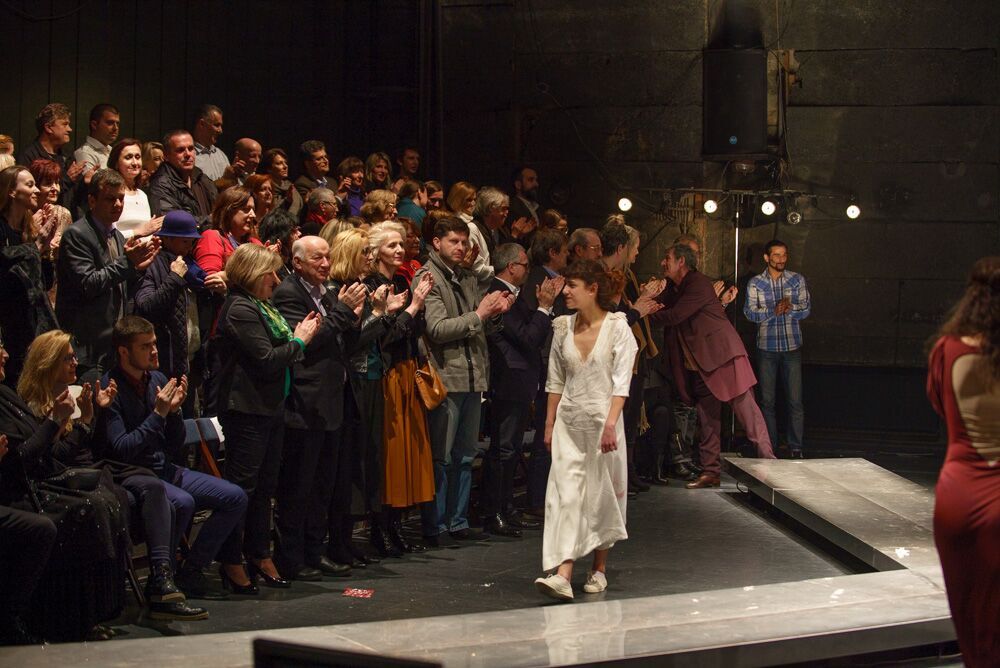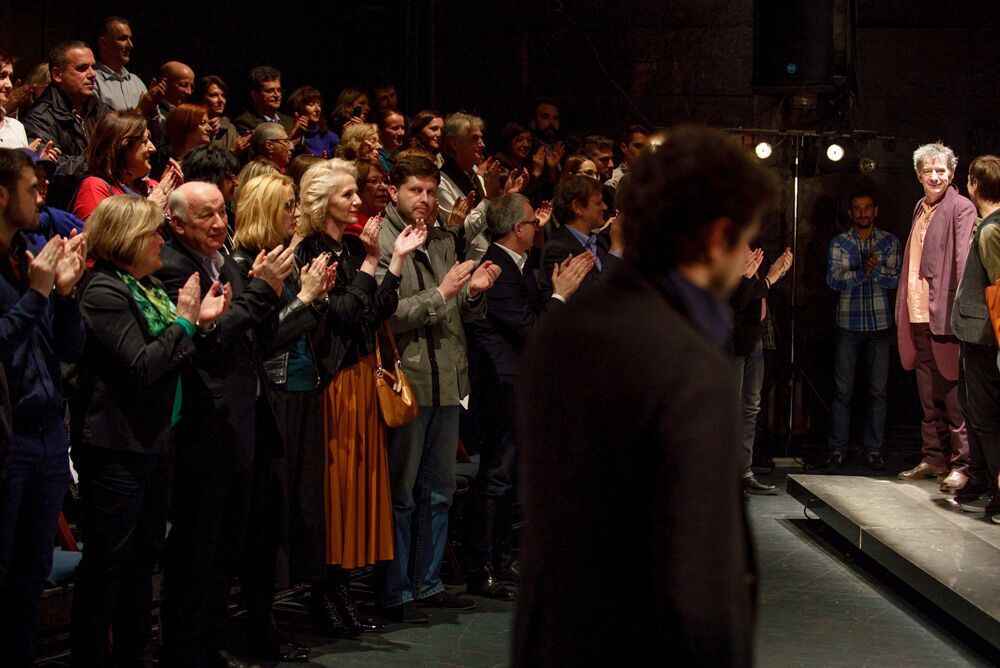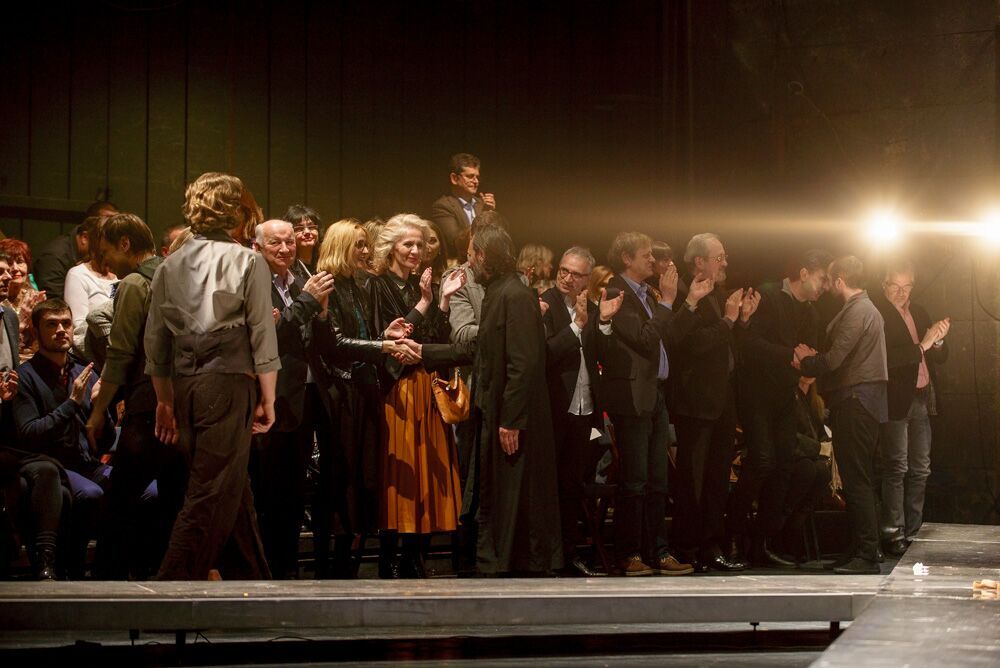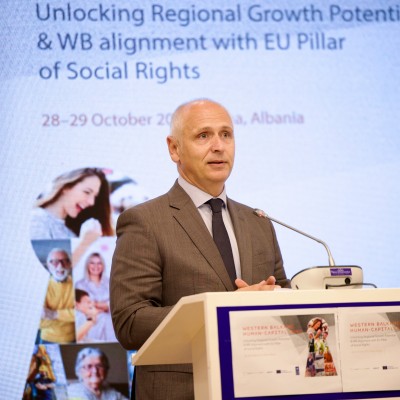An enchanting deconstruction of walls between us
22 March 2016

“Romeo and Juliet” in Sarajevo National Theater on 21 March 2016. (Photo: RCC/Amer Kapetanovic)

RCC supported “Romeo and Juliet”, a theater play produced by Belgrade-based “Radionica Integracije” and “Quendra Multimedia” from Pristina, performance in Sarajevo National Theater on 21 March 2016. (Photo: RCC/Amer Kapetanovic)

“Romeo and Juliet”, a theater play produced by Belgrade-based “Radionica Integracije” and “Quendra Multimedia” from Pristina, in Sarajevo National Theater on 21 March 2016. (Photo: RCC/Amer Kapetanovic)
This particular “Romeo and Juliet” is in many ways a paradigm of the challenges the theatre company faced as it mustered the courage to produce it. Major challenges right from the start. Conjuring up the concept was a challenge; not a dram smaller than to fundraise, it is an expensive production. Which was no less challenging than to do the casting in Belgrade and Pristina and to recruit also actors from Tirana and New York. Which was no less a challenge than to put all the pieces of this puzzle together and create a coherent and riveting “picture” in two languages, no less. Which is, and this is the final “which”, no less a challenge than to perform bilingually in Belgrade and Pristina and Zagreb and now Sarajevo – each and every show welcomed with the same reverence by the audience.
Familiar with the concept but before seeing the play, I found it also to be a challenge to my own theatrical curiosity. And no, yours truly is not a theatre critic, but theatre is one of my passions and I have been blessed with opportunities to see productions by Peter Brooke, Lindsey Kemp, Peter Stein, Peter Hall or Sam Mendes and to see on stage the greatest of the great like Glenda Jackson, Ian McKellen, Hellen Mirren, Nuria Espert (an amazing director as well), Simon Callow, Kevin Spacey or Willem Defoe. So, how did last night’s cast and production compare with the crème de la crème above?
I will admit to two prejudices or problems with the concept. The first was the bilingual performing. Sure, I’ve seen and enjoyed a play in Spanish without knowing a single word of Spanish beyond “Hola”; one of the beauties of theatre is that it is so much more than the spoken word, albeit, being familiar with the plot helps. But I couldn’t see what would be the benefit to performing in one of the languages in, say Pristina, and the other in Belgrade. The second problem was the fact that the director jettisoned the classic concept of the actors being on stage and we, the audience, in the auditorium. It has been done many times before of course, but bluntly, with several decades of being a part of that audience, I’ve become weary with directors making us move location, lie on our backs or even have our necks in a wooden garrotte (very claustrophobic, trust me). I happen to like sitting comfortably in the auditorium and was wondering why the director eschewed it and placed us into several rows of chairs on two sides of the stage. Sure, it brings us closer, makes the audience a more integral part of the theatrical experience but it also has a serious downside – far less people can see the play since the number of seats on the stage was limited to under 150.
Well, one of life’s greater pleasures, I find, is overcoming one’s prejudices or even better, to be persuaded to overcome them through a startling artistic performance. Yes, there actually is an excellent reason for the bilingual acting. Symbolically, it creates walls between the actors themselves and also between them and the audience. And what a delight it was to see those walls crumble and to sense, to experience the passionate cry for a similar collapse of the walls between the two nations that the ensemble and the production call for. When Capulet offers his hand to Montague over the dead bodies of their children, words become irrelevant. The message could not be clearer.
And why the audience divided on two sides of the stage? Well, because it was so much more than just giving us a close up perspective, which is always welcome of course. It is yet another metaphor for the divide between the nations with the actors between those two sides doing their best to show us just how ridiculous those divides are.
But there were two more prejudices which woke up when I saw the actors who play the title roles – Jovana Gavrilovic and Tristan Halilaj. These two as Juliet and Romeo? Nah… too teenage looking, not the type… wrong casting, these two can’t be the right choice. By Jove, was I wrong! Let me begin my plaudits with praise for Jovana and Tristan. Both brilliant as the child and the adult that these two roles demand from the actors. Both naïve and jaded; young with their love and aged with their families’ mutual hatred.
Every single member of the ensemble deserves a word of praise. What a princely figure Mensur Safciu cut as Escalus! What a brave and rash Tybalt turned out to be played by Faris Berisha. Paris – Nikola Rakocevic – so in love, so lost to reality. Mercutio via Goran Jevtic – bold, reckless and captivating. Armend Baloku a true vision of the noble Benvolio. Nebojsa Glogovac, brilliant both as the verbose angry father and as one reduced to void by the pain of his loss. Uliks Fehmiu, the understanding and compassionate Friar Laurence so calmly negotiating with himself the assistance to the young lovers and unwittingly their deaths. Edona Reshitaj, so regal and proud as Lady Capulet. Juliet’s nurse - Anita Mancic with yet another brilliant role under Miki Manojlovic’s director’s wand (the other being Blanka in “Dok nas smrt ne razdvoji”). Lady Capulet – Natasa Tapuskovic mirror imaging her husband’s pride and love and pain. Miki Manojlovic, a theatrical wizard who minimised his role as Montague on stage but maximised his role as director, making the right cuts and interventions in the script and staging. With assurances to all of them that they do have my full admiration, I have to single out Arta Selimi as the narrator/storyteller who turned out to be such a special link between the “us” on our seats and the “them” playing for those of us on our seats. Admittedly, her role is a most rewarding one – she is the only person on stage who is allowed to show the joy of performing. And did she do that! Beaming on stage for all who couldn’t and infecting the audience with the delight she so obviously carries in her heart and on her face. She will go far, she is a beautiful bud waiting for the opportunity to blossom.
But kudos go to each and every member of the ensemble, not just the ones on stage but very much to the “invisible ones” like the executive producer, Milica Milic. I can only begin to imagine the nightmare she must have to hang on to the zillions of strings that need to be pulled to make this theatre magic happen. Same for the co-producer Jeton Neziraj. Or the composer Vladimir Pejkovic with his minimalistic but oh so powerful and functional sound duvet for this production. Simplistic and self-explanatory scenography by Branko Hojnik and elegant choreography by Sonja Vukicevic. The everyday clothes selected as costumes by Zora Mojsilovic to drive home the message that this is here and now, that this could be any one of us.
Last, but far from least, how refreshing to see and not just hear the musicians. To have live and not taped music enrich the production. Such an exception in the Balkans, the norm in West End and Broadway. Vladimir Pejkovic, Dusan Petrovic, Damjan Babic and Nemanja Acimovic – thank you. And thank you director Manojlovic for insisting on live music and demonstrating that the investment is really worth it.
And, with an apology for the pat on our own back, kudos also for the RCC for recognising that regional cooperation is about miles of motorways and railroads, for jobs for armies of unemployed, for trying to get rid of roaming charges in the Balkans, for boosting security and rule of law in the region. And doing so much more to speed up the EU voyage of our corner of the globe. But also for recognising that while all of that is important, so is food for the soul and last night’s “Romeo and Juliet” was a culinary delight Lucullus would have been proud of.
Nenad Sebek
(More info on “Romeo and Juliet” can be found on http://www.radionicaintegracije.rs/?project=romeo-i-julija and http://www.qendra.org/?id=21&l=28)



